VILLAGE SOCIETY
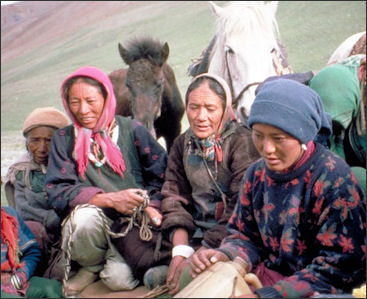
women in Zanskar,
a Tibetan area of India In some ways villagers all over the world — whether they live in Africa, Poland, Guatemala, or China — live remarkably similar lifestyles. Often the main thing that separates them is their religious beliefs and aspects of their life determined by the climate and landscape they live in.
Speculating on the illiterate village mind, journalist Alan Berlow wrote: "stories, intrigue, lies, gossip, speculation, gathered like rice in a basket and tossed up in the air, sending husks to the wind, leaving behind kernels of truth. Truth and half truths, anyway." It is a "missing link, a smoking gun, the connective tissue of random events, the effort to explain things that resist explanation”.
Villagers help one another in various ways. They help each other harvest their crops and build their homes. If someone has a serious health problem often everyone pitches in at least some money to help pay the medical bills. They also lend a hand taking care of widows and orphans, fighting fires and helping fix farm equipment.
Village life is strictly codified. Since everyone knows and gossips about each other, morals tend to be similar. People who stand out or assert themselves as individuals are often regarded with suspicion and hostility by other villagers. People that are different are made fun of.
See Society
Driving and Honking Horns as a Sign of Character and Personality
One diplomat told the Washington Post, "I think driving reflects a society." In some countries "there is no established social contract. People do not believe that if they give up something to the general good, everyone can benefits. They believe that if they do not cut you off [in traffic], you will cut them off, and everyone is pushing for the maximum advantage all the time.”
Drivers honk their horns a lot. And often the louder the horn the better. There are businesses in many cities that specialize in removing the honking device from cars and replacing them with ones that are twice as loud.
Taxi drivers are particularly notorious for their honking. So there noise stands out, some install special horns that sound like crying babies, barking dogs, crowing roosters or mooing cows.
Describing the fondness for honking, John Daniszweski wrote in the Los Angeles Times, "How do they honk? Let us count the ways. They honk to warn pedestrians to stand back, or to pass another car, or if another car is veering close to them. They toot defensively coming into intersections. They toot while stuck in traffic jams, which is most of the time...If they drive taxis, they beep for their supper. If they just got married or if their team won a soccer match, they honk for sheer joy — even at 2:00am. If they want a mango juice or a newspaper, they beckon the street vendor with a friendly honk."
Optimism and Resourcefulness
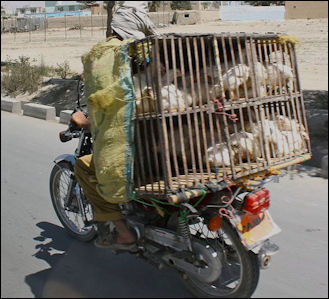
Villagers are often very resourceful and very patient and make the most of available opportunities because they have little choice but to be resourceful and patient and seize the opportunities they may have. When bad things happen they often accept them as manifestations of God's will or the doings of some evil or naughty spirit.
Even though life appears to be a struggle, many people say they are happy with their lives. In crowded cities or small villages it is important to be polite and good natured. When individuals are always surrounded by lot of people, society runs more smoothly and life is easier if individuals are friendly, courteous and upbeat than if they are moody and grumpy.
The economist Eduardo Lora found that in countries with similar levels of per capita income, respondents experiencing higher economic growth rates on average, said they were less happy than those with less growth. One explanation is that rapid economic growth typically brings greater instability and inequality and that makes have-nots envious and unhappy.
Generosity
People who have nothing are often very hospitable, generous and willing to share what little they have with guests. It often seems that poorer villagers are the more they are willing to give. "People here help one another," one villagers said. "If someone has no food one day, others share. It makes life bearable."
Travelers from wealthy foreign countries are often invited for dinner are honored with special dishes and treats that cost the equivalent of several weeks earnings. One adventurer who traveled to many countries on horseback said, once we left Europe, "we never had to buy a meal...villagers always fed us." On bicycle trips through the developing world, I found myself constantly being waved to from the side of the road for tea and food.
Beauty and Cleanliness in the Developing World
Beauty is arguably less prized in the developing world than in the developed world. A good bride in many countries is considered to be a woman who can "cook, look after her husband and give him sons." That is the opinion of some any way. The owner of a successful Chinese cosmetic company told AP, “All women want to look pretty, and poorer women want it even more. With good education or rich parents, appearance is what they count on to move up the social ladder.”
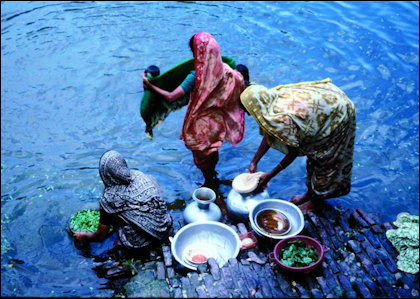
Washing utensils and vegetablesAvon ladies are found pretty much everywhere. When village women have some free time they like to do things like meet at a friend’s house and try cosmetics and fingernail polish.
Cleanliness is virtue inside people’s homes anyway. People often litter in public and streets may be beat up and full of trash but people keep their homes clean. Even the inside of shacks and slums are often is spotless. Often times the only way a poor family surrounded by filth can express their self worth is through their clean clothes, bodies and home. Children usually wash themselves before school with rough soap and well water in a pail. Mothers spend a lot of time making sure that their house is tidy and clean. Floors are mopped on daily basis and walls are scrubbed weekly. The condition of a house is a reflection on the family and especially the mother.
Village Customs
Religious and cultural bonds are very strong. Traditional culture is most pronounced at feast days, festivals, weddings and funerals.
Holidays and festivals have traditionally been a time when families gathered, village-wide events were held and people who left the cities or wherever returned to their home villages.
Villagers are often very courteous people and have tons of greetings. There are so many of them in fact that sometimes it takes about ten minutes for the meat of conversation to begin. When a new arrival comes to a party with, say, fifty people, everyone stops what they doing to welcome the new guest, and often it seem like it is time to go home when the last introduction has been made.
Men and women often socialize separately. At mealtime men usually eat together and women and children eat after the men are finished. Even when something they need is right in front of them the men will call for the women to come and serve them instead of getting it themselves.
Socializing and Privacy
People like to hang out and socialize on the street or in squares, meeting houses or courtyards. Conversation is a major pastime and people enjoy joking around and teasing one another. Things are often done with the help of personal contacts. If you can't find someone with a service you need you find someone who knows someone who does.
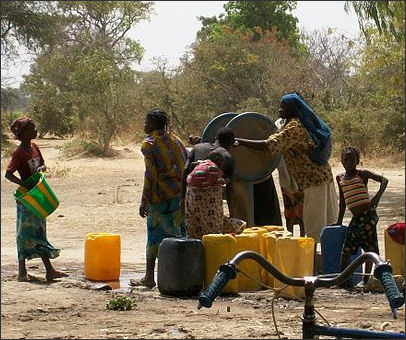
Women around the water pump in Burkina Faso Homes are open to family and friends. Brothers, sisters, cousins, uncles and aunts are frequent visitors. Friends often don’t knock when they visit, they just walk in. It is not usual for guests to spend the night. There is not an emphasis on privacy and calling ahead to let people know you are coming like there is the United States.
A casual stop over can sometimes turn into a visit that lasts a few days or a week. Guests who show up and hang around often disappear, however, if work need to be done. Children like house guests because they spoil the children and give them lots of attention.
"The search for personal privacy is a pervasive theme in the daily life of people who live in small villages," wrote Columbia anthropologist Marvin Harris. Villagers "apparently know too much about each other's business for their own good...One must whisper to secure privacy — with walls of thatch there are no closed doors. The village is filled with irritating gossip about men who are impotent or who ejaculate too quickly, and about women's behavior during coitus and the size, color, and odor of their genitalia."
Sometimes seven people sleep together in a single room and parents have sex while their children are sleeping.
Village Society
Village society is often tradition bound and built around loyalty to family, extended families and hometowns. The basic political and social units in villages societies are the tribe, clan, family and the village. Elders and leaders wield much authority.
Traditional societies are often based on three elements: prestige, competition between clans and individuals, and the concept of reciprocity of gifts of money, goods or services. Prestige is measured in terms of political power, knowledge, material possessions and the ability to accomplish feats.
Traditional societies are held together by systems of community responsibilities in which everyone in a neighborhood or village agrees to help everyone else with agricultural chores such as planting, harvesting, building irrigation ditches and constructing community buildings. Leaders make sure all these tasks are done efficiently for everyone in the community with no one sluffing off or skirting their responsibilities.
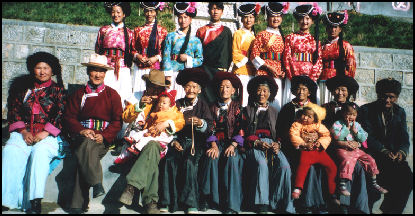
Matrilineal Mosou family in China The social code that defines the community responsibilities is often combined with religion, mythology, tradition, morality and tribal law. Leaders are sometimes believed to be aided by supernatural forces in carrying out the community's tasks which are often tied up in some way with religion and tribal culture.
Village life can be very competitive. There is often a struggle for resources bubbling just under the surface. Villagers know each other well and conflicts seldom arise by accident. Slights are assumed to be deliberate and they often are. Once a conflict gets going it often persists and structures are created to manage it not resolve it.
According to the Encyclopedia of Culture: “Villagers live by tradition and lack the incentives, knowledge, or security to make changes. Change is seen as a disruptive force and threatening to the harmonious relationships that villagers have established with their environment and their fellow villagers.”
Patrilineal and Matriarchal Societies
Most of the world's societies are patrilineal, meaning that things like social status, property and family names are all inherited along patrilineal lines — passed down from father to son. Kin groups are also usually patrilineal. This means that relatives of the father of an individual are welcomed as family while those of the individual’s mother are welcomed as guests.
About 10 to 15 percent of the world's societies are matrilineal, meaning that things like social status, property and family names are all inherited along matrilineal lines — passed down from mother to daughter.
In matrilineal societies, the basic social unit is a woman, her children and the woman's brother. An individual's family is defined by his or her female descendent and the women and maternal uncles in the family.
Matrilineal societies are often still dominated by males, who control economic and religious life. Authoritarian figures are not the matrilineal females but males such as the female’s brother, maternal uncle, maternal grandmother's brother or maternal grandmother's sister's son.
Tribes and the Tribal Mentality
Millions of people belong to major tribes, which break down into smaller clans. The largest tribes have more than 1 million members; the smaller ones, only a few thousand or even a few hundred. Some have been around for centuries. Some are relatively new creations.
Tribes tend to be defined as groups with a specific name. Sometimes they are made up of the inhabitants of villages in a specific area. Other times they are more dispersed. Often times they claim a common ancestor but often the links to this ancestor are unknown and perhaps fictitious. Sometimes the composition of a tribe changes to accommodate new alliances and the break up of old ones.
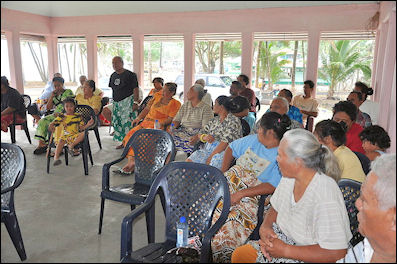
Town meeting in American Samoa Tribes generally are associated with a specific area. Sometimes they have been in that area for a long time. Other times they attain it through military incursion or a government connection.
Tribes often have strict caste-like hierarchies and codes of conduct and justice that have allowed them endure through the centuries. The leaders of tribes are called chiefs or some other name. They are usually selected by elders in the tribe.
Describing tribal mentality the Iraqi editor Saad al Bazzaz told the Atlantic Monthly: “In the villages, each family has its own house, and each house is sometimes several miles from the next one. They are self-contained. They grow their own food and make their own clothes. Those who grow up in the villages are frightened of everything. There is no real law enforcement or civil society. Each family is frightened of each other, and all of them are frightened of outsiders...The only loyalty they know is to their own family, or to their own village.”
“Each of the families is ruled a patriarch, and the village is ruled by the strongest of them. This loyalty to the tribe comes before everything. There are no values beyond power. You can lie, cheat, steal, even kill, and its okay so long as you are a loyal son of the village or the tribe. Politics...is a bloody game, and its all about getting or holding power.”
Clans, Village Councils and Headmen
The most important social institutions in village life are the clan, the village council and headman, or chief. Villages are composed of perhaps five to 25 clans, with other members of clans sometimes living in other villages, sometimes not. Clan leaders make up the village council. Clans are ranked and the leader of the highest clan is the headman (leader of the village) and the most prominent member of the village council.
Villages — and cities, towns and communities — have traditionally been dominated by powerful families and clans. Clans are usually composed of several extended families that are related to one another and usually have a common ancestor that often provides the clan members with a family name. Social status is determined by rank of a clan and the position within the clan. Status within the clan is determined by family background and meritorious deeds performed for the clan.
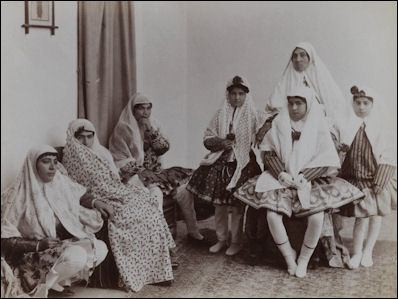
family scene with mothers and daughters The headman is the highest moral and legal authority in the village. He supervises the welfare of the community, settles disputes, makes decisions on water allocation, education and fishing rights and sometimes advises villagers on who to vote for in government elections. But he is by no means a dictator. Before carrying out a decision he must have the endorsement of other clan leaders in the village council. Many villages have a council house, where village people (usually men) meet to discuss problems and issues facing the village.
In some societies the headman is also a shaman, healer and religious leader. In other societies healing and religious duties are taken care by someone else. Some headmen are authoritarian; others work closely with their councils; but ultimately they are the ones who have to make tough decisions and the buck stops with them. Many villages have a means of getting rid of a headman if he becomes too unpopular. There are not many examples of headwomen.
Some headmen can not be talked to directly by strangers or ordinary people, and intermediaries are used for communication. Meetings with chief usually involve preliminary greeting and small talk. When a request is made or the permission is asked for, the chief usually says no. After some socializing and some drinking he often says yes.
There is often some kind of liaison that acts as an intermediary between the village and the local and national government.
Extended Families
Many homes are occupied by an "extended family," made up a variety of relatives, not just a "nuclear family" with parents and children. The extended family is the basis of society and exerts a major influence on an individual’s life and decisions.
It is not uncommon for three generations to live in the same house. A typical household consists of a husband, wife, children, grandparents and unmarried brothers and sisters. In large extended families, uncles, aunts, nieces and nephew are often treated with same familiarity as parents and children. If they don’t live in the same house or compound, grandparents, uncles, aunts and cousin often live either next door or in the same neighborhood. Close family friends are often also called grandfather, grandmother, uncle or aunt.
Image Sources: Wikimedia Commons
Text Sources: New York Times, Washington Post, Los Angeles Times, Times of London, Yomiuri Shimbun, The Guardian, National Geographic, The New Yorker, Time, Newsweek, Reuters, AP, Lonely Planet Guides, Compton’s Encyclopedia and various books and other publications.
Last updated January 2012
